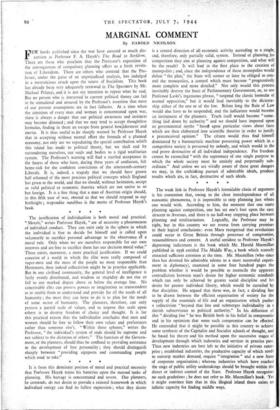The justification of individualism is both moral and practical. "
Morals," writes Professor Hayek, " are of necessity a phenomenon of individual conduct. They can exist only in the sphere in which the individual is free to decide for himself and is called upon voluntarily to sacrifice personal advantage to the observance cif a moral rule. Only when we are ourselves responsible for our own interests and are free to sacrifice them has our decision moral value." There exists, moreover, a more practical justification. If we could conceive of a world in which the elite were really composed of super-men and the mass of the people no more responsible than Hottentots, then indeed collectivism might be in practice applicable. But in any civilised community, the general level of intelligence is fairly evenly distributed, and wisdom or stupidity do not rise or fall to any marked degree above or below the average line. No conceivable elite can possess powers or imagination so transcendent as to enable them to understand and provide for all the needs of all humanity ; the most they can hope to do is to plan for the needs of some sector of humanity. The planners, therefore, can only possess a partial scale of values, and to impose this scale upon others is to destroy freedom of choice and thought. It is for this practical reason that the individualist concludes that men and women should be free to follow their own values and preferences rather than someone else's. " Within these spheres," writes the Professor, " the individual's system of ends should be supreme and not subject to the dictation of others." The function of the Govern- ment, or the planners, should thus be confined to providing assistance to the development of free personality ; they should distinguish sharply between " providing signposts and 'commanding people which road to take."
* * * *


























 Previous page
Previous page